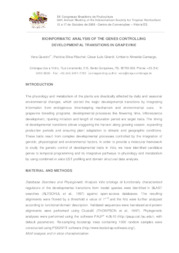Bioinformatic analysis of the genes controlling developmental transitions in grapevine.
Bioinformatic analysis of the genes controlling developmental transitions in grapevine.
Author(s): QUECINI, V.; RITSCHEL, P. S.; GIRARDI, C. L.; CAMARGO, U. A.
Summary: The physiology and metabolism of the plants are drastically affected by daily and seasonal environmental changes, which control the major developmental transitions by integrating information from endogenous time-keeping mechanism and environmental cues. In grapevine breeding programs, developmental processes like flowering time, inflorescence development, ripening initiation and length of maturation period are target traits. The timing of developmental transitions allows staggering the harvest along growing season, expanding production periods and ensuring plant adaptation to climatic and geographic conditions. These traits result from complex developmental processes controlled by the integration of genetic, physiological and environmental factors. In order to provide a molecular framework to study the genetic control of developmental traits in Vitis, we have identified candidate genes to temporal programming and its integrative pathways to physiology and metabolism by using combined in silico EST profiling and domain structural data analysis.
Publication year: 2008
Types of publication: Paper in annals and proceedings
Unit: Embrapa Grape & Wine
Keywords: Bioinformática, Desenvolvimento, Genética, Planta, Uva, Viticultura
Observation
Some of Embrapa's publications are published as ePub files. To read them, use or download one of the following free software options to your computer or mobile device. Android: Google Play Books; IOS: iBooks; Windows and Linux: Calibre.
Access other publications
Access the Agricultural Research Database (BDPA) to consult Embrapa's full library collection and records.
Visit Embrapa Bookstore to purchase books and other publications sold by Embrapa.

